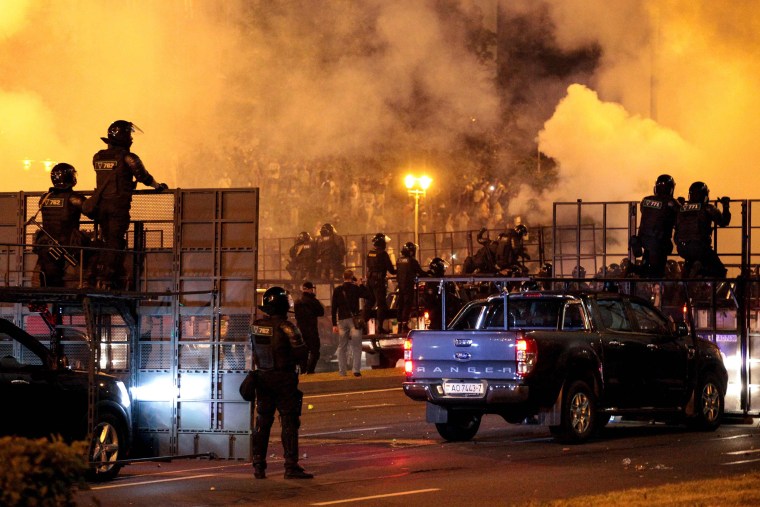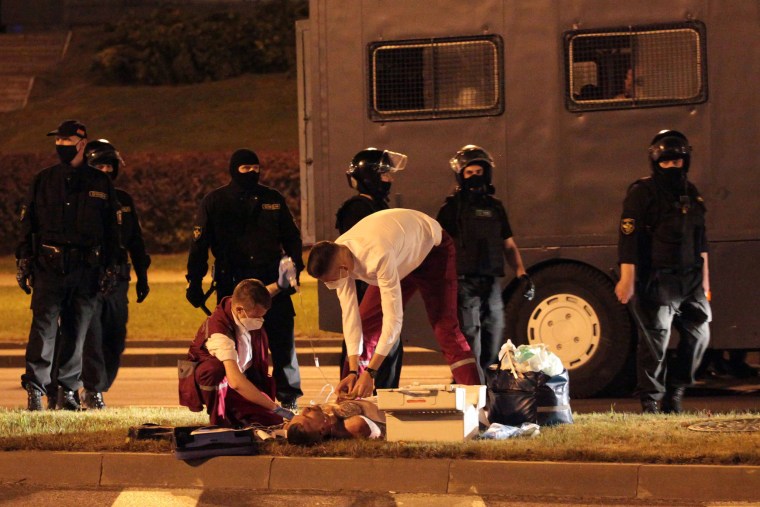MOSCOW — Dramatic protests erupted across Belarus overnight as the country's authoritarian president declared a sweeping victory over a popular opposition candidate in elections widely seen as riddled with irregularities.
Alexander Lukashenko has resorted to violent crackdowns on several occasions to maintain his grasp on power in the former Soviet nation for the last 26 years. But despite recent overtures to the West signalling that his regime was softening, Lukashenko reverted to the old playbook Sunday.
According to official exit polling released by the country’s Central Election Commission after polls closed, Lukashenko was on his way to receiving more than 80 percent of votes cast from a turnout of more than 80 percent.
He is often referred to as “Europe’s last dictator,” but Sunday’s results strained credulity even by those standards.
Crying foul, streams of people began taking to the streets across Belarus to support surprise opposition star Svetlana Tsikhanouskaya.
She has emerged in recent weeks as an unprecedented threat to Lukashenko’s authority, inspiring the largest wave of protests against the regime in the past decade.
Last night, Lukashenko opted to answer this movement with a heavy-handed crackdown.
Internet access in Belarus was heavily curtailed as polls closed, making it difficult to ascertain exactly what was going on. Many foreign journalists were denied accreditation to enter the country to cover the election, further complicating the picture.
Videos and accounts made their way out of Belarus overnight, painting a dramatic picture of peaceful protesters appearing to be met with disproportionately violent responses from riot police — especially in the capital city Minsk.
Lukashenko warned Monday that the protesters will face a tough crackdown, labeling them “sheep” being manipulated by foreign masters.
“We will not allow them to tear the country apart," he said.
The European Union condemned the police crackdown and called for an immediate release of all those detained.
"We're deeply concerned by the Belarus presidential election," White House press secretary Kayleigh McEnany said at a briefing Monday, citing intimidation of opposition candidates and the detention of protesters and journalists.
The U.S. urged Lukashenko's government to refrain from the use of force, she added.

For her part the opposition leader Tsikhanouskaya rejected the results and asserted that she was the winner of Sunday’s contest, setting the stage for a prolonged standoff between her supporters and the Lukashenko government.
“We do not recognize the election results. We have seen the real tallies. We urge those who believe their votes to have been stolen to not remain silent,” she said in a press conference Monday, according to independent Russian outlet Meduza.
Her campaign has said they intend to keep up the pressure.
Belarusian authorities have not released any official tallies of the number of protesters who took to the streets in Minsk last night — let alone across the country — but on Monday the interior ministry said it had arrested 3000 people, 1000 of which were detained in Minsk.
Videos that made it online showed thousands of protesters gathering in various locations.
Authorities said nobody had been killed in the clashes, though photos and video appeared to show many were injured.
Tensions are not only playing out in physical clashes. Internet connectivity has been severely limited across the country since Sunday, several digital rights groups have said.
Access Now, an internet freedom nonprofit, said that Belarusian authorities had blocked independent media sites, as well as several virtual private networks, a service that can be used to circumvent some internet censorship methods.
NetBlocks, a service that tracks internet outages, found evidence of multiple internet disruptions, particularly in Minsk. As polls opened, Twitter said its platform had been blocked in the country.

Lukashenko now finds himself in a tenuous position, Emily Ferris, a research fellow specializing in the former Soviet space at London's Royal United Services Institute think tank, told NBC News on Monday.
Lukashenko has in recent years found himself increasingly dependent on foreign, particularly Western, support in order to remain in power and assert independence from neighboring Russia under President Vladimir Putin.
A further crackdown could jeopardize this support.
“This is a difficult balance for Lukashenko to strike,” Ferris said, “ensuring that he quells the waves of protests in time and maintains some element of political stability, while also making sure that potential western partners are not put off by his actions.”
Tsikhanouskaya is calling on Lukashenko to enter into a dialogue with the opposition and begin a peaceful transition of power.
“We are for peaceful changes,” she was quoted as saying by the Russian state-run TASS news agency on Monday.
“The measures implemented by the authorities were disproportionate," she added. "And we will do everything we can to prevent this from happening again.”
Protests were expected to continue Monday.
The Associated Press contributed to this story.
